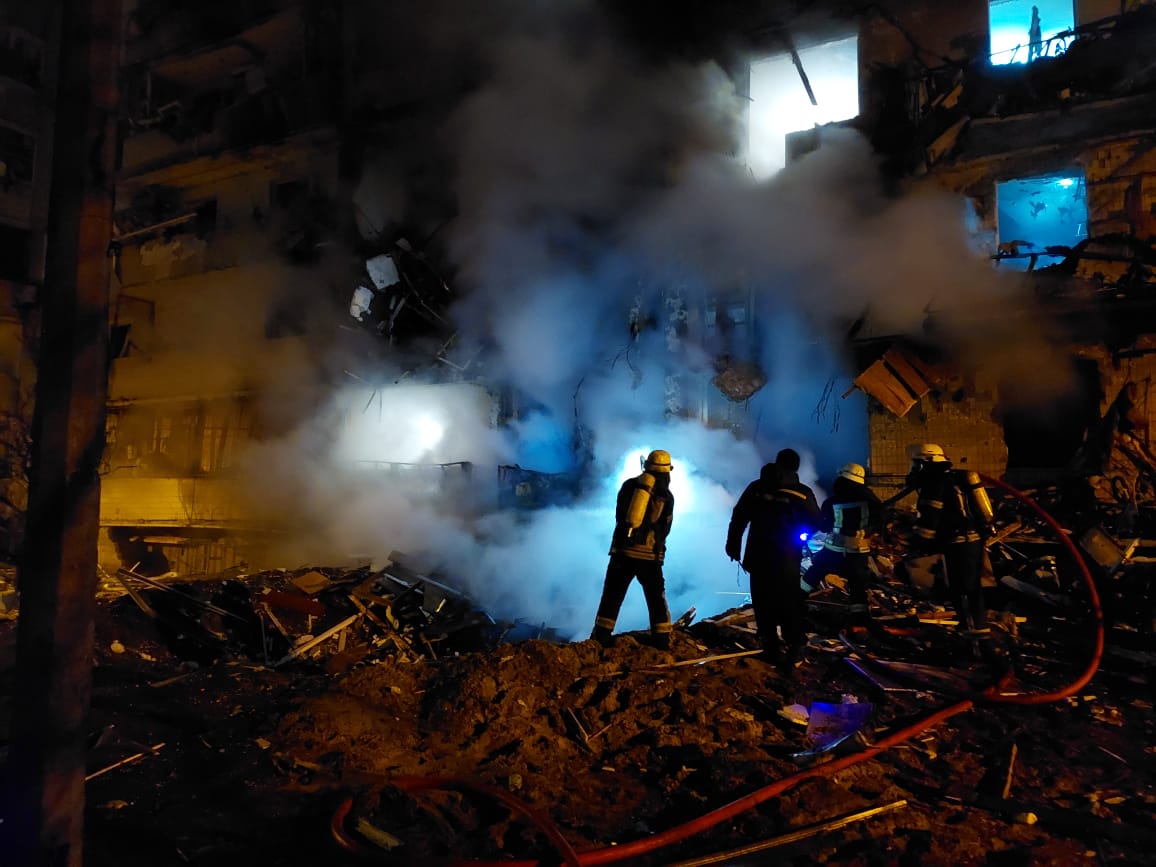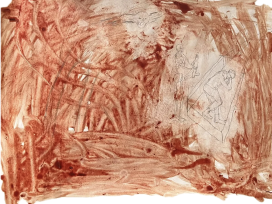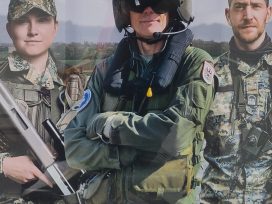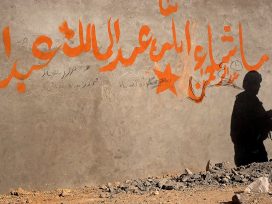Russia’s war
When war becomes a reality, time is of the essence. Slow political responses raise questions about underlying reasons for reluctance. And as Russia wages war on Ukraine, how the situation is described at distance also matters. How can Putin’s position be pulled back from the black hole of media and political acquiescence?

Apartment block in Kyiv (Oleksandr Koshyts Street, 7-A) after shelling during Russian invasion of Ukraine.
Photo by Kyivcity.gov.ua, CC BY 4.0, via Wikimedia Commons
In a recent Le Monde article, Dr. Marie Mendras aptly reminded us that the much-talked about ‘Ukraine crisis’ is by no means ‘Ukrainian’ but first and foremost ‘Russian’. It is ‘Russian’ not only in purely factual terms — insofar as it was instigated and amplified to its current disastrous scale by the Russian political leadership. It is ‘Russian’ also in philosophical terms — insofar as it reflects the profound crisis of Russian identity, its incompatibility with the modern post-imperial world and its inability to come to terms with western-invoked modernity, post-Cold War international order and sovereignty of Ukraine, which still is imagined as a part of the Russian ‘self’.
Strictly speaking, the ‘Ukraine crisis’ — to a degree we can consider it ‘Ukrainian’, i.e., a genuinely domestic phenomenon — has a very clear and exact timeframe. It started on 21 November 2013, when the Ukrainian government succumbed to Moscow arm-twisting and scrapped the Association Agreement with the EU that had already been prepared for signing a week later.
The government’s last-minute surrender to Russian blackmail was just too obvious and scandalous, so it evoked mass protests. They ran peacefully within a week, until the government employed brutal force to disperse protesters. This triggered a real crisis as the government intensified pressure, and the protesters responded in kind. The violent stand-off culminated on 22 February, when the president mysteriously disappeared from Kyiv and popped up a day later in Russia.
The reasons and circumstances of his evacuation are still obscure since nobody ever attempted to storm his palace, nor were there any threats to his life. (Indeed, the protesters demanded only his resignation and early elections). The escape of the president was an extraordinary development, but Ukrainian civil society and political class did its best in the unusual situation: they rapidly moved politics back from the streets to parliament.
On the same day, the constitutional majority of MPs voted 328–0 in favour of impeaching the runaway president and scheduled new presidential elections for 25 May, the earliest day permitted by the Constitution (that required three months for the electoral campaign). They elected the new head of parliament who assumed the role of interim president (again, according to the Constitution) and formed the new government. On 25 May, Ukrainians elected the new president from a bunch of candidates (including those who are openly pro-Russian). That date (if not the 22 February) can be considered the end of the ‘Ukrainian crisis’ — insofar as the full legitimacy of state power was reestablished.
Since then, Ukraine has evolved into quite a ‘normal country’, as aptly defined by Timothy Snyder, with competitive politics, free elections (2014 and 2019) and the peaceful transfer of power to political rivals, freedom of speech and assembly, modest economic growth (still remarkable in the conditions of a de-facto war and lack of foreign investments) and, of course, multiple domestic tensions that are common to all democracies but can hardly be defined as a ‘crisis’.
The term, nonetheless, persists and we still read everywhere about the ‘Ukraine crisis’, even though in reality it is less and less about Ukraine but more and more about Russia — the Russian war with Ukraine, with the West, with democracy and the international order.
In fact, a subtle semantic difference between ‘Ukraine crisis’ and ‘Ukrainian crisis’ in most languages disappears; actually even in English (or French) the terms are quite often used interchangeably — either by the speaker’s neglect, or convenience, or slip of the tongue.
The formula ‘Ukraine crisis’ is really dubious, but the formula ‘Ukrainian crisis’ is much worse: it distorts the reality nearly as much as the infamous description of Auschwitz as a ‘Polish concentration camp’. It supports the Moscow-baked narrative about the ‘civil war’ in Ukraine and is usually embraced by pro-Russian authors who promote that narrative and deny any Kremlin complicity in that ‘crisis’.
The seemingly neutral formula ‘Ukraine crisis’, which refers not only to the crisis in Ukraine but also to that around and ‘about’ Ukraine, is not as flawed and harmful as the ‘Ukrainian crisis’ but is still quite ambiguous. Nonetheless, it has become an established term in international media and academia.
Even today the reputable Foreign Policy holds the permanent rubric Ukraine Border Crisis, while the Financial Times offers a daily update under the title Ukraine conflict. It looks impartial but ambiguity reigns supreme.
Nothing in those titles implies that some unspecified country assembled 150,000 troops and heavy weaponry at Ukraine’s border, and might be somehow involved in that ‘crisis’. Or that the ‘conflict’ might have one more participant besides Ukraine, and that the other, unnamed participant, is running not just a ‘conflict’ but a de facto war.
It seems that the western media, scholars, and politicians had overplayed their much-vaunted ‘correctness’ and ‘impartiality’. They adopted a seemingly neutral formula ‘Ukraine crisis’ in 2014 when the Ukrainian political crisis of the past winter could have been at least evoked, the overall information about the conflict was presumably scarce and muddled, the Russian role was disputed, and the hopes for a peaceful settlement still warmed the hearts of western idealists (as well as pragmatists engaged with Moscow in a profitable business).
But, from the very beginning, the formula obscured, silenced, and discursively marginalized Russia’s role in the process. It created ambiguity, a grey zone, where all kinds of fake news and propagandistic messages disseminated by the Kremlin got the same weight and attention as proven facts and real events.
The traditional model of western media to present information from both sides, to provide an allegedly balanced view, fails completely as it encounters not two different interpretations of the same facts or events but, instead, facts and reality on one side and blatant lies and unabashed chutzpah on the other.
Mass media and, to a degree, academia and mainstream politicians, in their pursuit of “impartiality”, become the laundering machines for Kremlin fake news and propagandistic distortions. And since all this is a key element of the ‘hybrid war’, non-resistance means in fact a tacit collaboration.
As a result, we find ourselves in a skewed reality where the arguments of a rapist and of his victim are treated equally, and the truth is supposed to be found somewhere in between. As I write these words, the international media multiply information copycatted either from Reuters or, with minor differences, from the DPA (Deutsche Presse-Agentur): ‘Russian-backed rebels and Ukrainian forces traded accusations on Thursday that each had fired across the ceasefire line in eastern Ukraine’.
Competent readers may know that Ukrainian officials declared — many times and at various forums — that they had no desire to take the ‘separatist’ regions by force, and that Ukrainian society at large has little appetite for a forcible, if any, takeover of those regions. They may also know that Russia amassed a huge army at Ukraine’s border and is looking merely for a pretext for invasion along the lines of the 2008 Ossetian-Georgian (or the 1940 Soviet-Finnish, or 1939 German-Polish) template, and, therefore, ‘mutual accusations’ are neither a ‘middle view’ of the situation nor a ‘half-truth’ but a sheer lie from Moscow’s side put on an equal footing with hard facts on the Ukrainian side — facts that can be proved by both satellite photos and OSCE observers on the ground.
Sure, respectable media — like Wall Street Journal, Jerusalem Post, or Turkish aNews — provide due explanations, but many readers get a sensational title and do not necessarily go deeper into the text. They get the title that features the news about ‘separatists’ and government forces who ‘traded accusations’ in the violation of ceasefire, but it’s unclear who started shooting (and why), so readers are most likely to feel that the truth is uncertain if it exists at all, that both sides are alike, both are not trustworthy and, ultimately, the readers may come to a ‘plague on both their houses’ conclusion: the ‘crisis’ is not our business, let’s stay further away from those barbarians.
And this is exactly what Moscow needs: not to persuade that the Kremlin is right and holds the truth but to create a grey zone where ‘Nothing Is True and Everything Is Possible’. They lay the ground for victory in information warfare ahead of the military invasion, – as they meticulously did 14 years ago in Georgia and then six years later in the Crimea. And the West once again appears feckless and helpless against the challenge.
The rogue regime that we observe in Moscow today is not only a product of the peculiar Russian history, of complex social processes, or psychological complexes of the KGB elite. It is also a product of western, limited and often distorted, knowledge of that country and the entire region, of wishful thinking that often accompanied it, and of a persistent reluctance to call things by their proper names and take the adequate stance that can be based only upon adequate naming.
The collective ‘West’ turned a blind eye in 1999 at the horrific explosions of the apartment buildings in Moscow and Volgodonsk – despite abundant evidence of FSB involvement. It mildly condemned Russian war crimes in Chechnya and reserved the label ‘genocide’ for Milosevic. It softly reminded but never insisted that Moscow promised (and signed a memorandum back in the 1990s) to withdraw troops from Moldova where they are still posted illegally (in an officially neutral country — with best regards to today’s proponents of Ukraine’s neutral status).
It randomly expressed some ‘concern’ with the Kremlin crack down on opposition, independent mass media, persecution and even the assassination of political opponents, which had always been a marginal issue in the West-Russia relations. Even the invasion of Georgia and occupation of its territory did not evoke any serious condemnation, let alone sanctions. The West happily bought the Moscow narrative about Georgia, the aggressor who attacked Russia — though Georgia did it not in Rostov, not in Moscow, not even in the disputed Chechnya but, ironically, in its own territory. Period.
Putin learned all these lessons and invaded Crimea with due self-confidence. He probably still cannot understand why his move evoked such condemnation and, worse, sanctions. Why the same politicians who met him with a standing ovation in Bundestag after the Moscow explosions, who awarded him with the Ordre national de la Légion d’honneur after mass killings in Chechnya, and initialed the ambitious Partnership for Modernization programme after he carved up Georgia, — why, on earth, they suddenly remembered some laws, agreements and principles?
Putin may feel abused, like a child who has suddenly been reprimanded for the minor tricks and shenanigans that had usually been condoned or passed unnoticed. His eventual hybrid war with the West is a kind of revenge — not only for the ‘greatest catastrophe of the twentieth century’, as he defines the end of the Soviet Union, and not only for the perceived ‘hijacking’ of Ukraine from his ‘privileged sphere of interests’ but also for the sudden change of the rules or, rather, their applicability.
The West seems to have finally come to terms with the rogue essence of the Kremlin regime — after eight years of the de facto Russo-Ukrainian war deemed euphemistically a ‘crisis’, after Moscow’s interference into Western elections, hacker attacks, and the spectacular assassinations of Kremlin opponents in their western refuge, and finally after the crude blackmail of Ukraine and the West with a threat of military invasion.
Yet the wake-up call is neither full nor certain; there are still too many Putinverstehers in different countries, and too many politicians let alone businessmen everywhere who would prefer not to sacrifice their palpable benefits for the freedom or even lives of the remote people of whom they know nothing. They still do not dare to call a spade a spade, a killer a killer, and a rogue regime a rogue regime.
‘The West always seeks solutions and stability’, maintains Kurt Volker, and Putin knows this perfectly. He knows ‘the West’s constant preference to avoid confrontation and uses crises and instability to create points of influence’.
Putin plays his favourite game skilfully – ‘who blinks first’ – and raises the stakes by enhancing his image of a rogue guy who has gone crazy, probably even suicidal. It’s just a fake, an image, but it works. The Western leaders and diplomats are still trying to appease him – even though Putin himself along with his lackeys openly mock, insult and humiliate Westerners.
‘Tragically,’ Anne Applebaum concludes, ‘Western leaders and diplomats … still think they live in a world where rules matter, where diplomatic protocol is useful, where polite speech is valued. All of them think that when they go to Russia, they are talking to people whose minds can be changed by argument or debate. They think the Russian elite cares about things like its “reputation”. It does not. In fact, they are talking to the people who aren’t interested in treaties and documents, people who only respect hard power’.
This does not bode well for Ukraine insofar as westerners still repeat the mantra on ‘dialogue’ and try to persuade serial killers to stop killing and shift from ‘raw meat’ to ‘fruits and vegetables’. There is, however, a silver lining in Applebaum’s rather pessimistic jeremiade. She reminds us that Russian leaders do not care much about the people and therefore about the sanctions that target the country.
But they do care about personal wealth and power. So hit them where it hurts most. Target their illicit property and bank accounts in the West, their visas and, more generally, all the dolce vita in the despised Gayropa that most of them and their relatives are accustomed to enjoy. It is high time to call crooks crooks, and bandits bandits, and to treat them accordingly. This is a bitter remedy but, alas, the only one remaining.
This article was first published in Desk Russie on 25 February 2022.
Published 27 February 2022
Original in English
First published by Desk Russie
© Mykola Riabchuk / Desk Russie / Eurozine
PDF/PRINTIn collaboration with
In focal points
- Not epistemic enough to be discussed
- Another lost generation of art?
- A trace of Russia at the heart of Austria
- What makes a humanist kill?
- Something happens, somewhere
- Vertical occupation
- No longer a footnote
- The Ides of March
- Counteroffensive exhibitions
- No peace without freedom, no justice without law
Newsletter
Subscribe to know what’s worth thinking about.
Related Articles

For those who suffered the consequences of Yalta’s division of Europe, the Helsinki Final Act brought grounds for optimism. Today, as Russia’s regressive war on Ukraine reopens old conflicts, it stands as a monument to European modernity.

Artist Marharyta Polovinko’s creativity persisted in a tormented form through her experiences as a soldier on the Ukrainian frontline. The words of a recently called-up fellow creative and young family man provide a stark reminder that the Ukrainian military is buying Europeans time.






